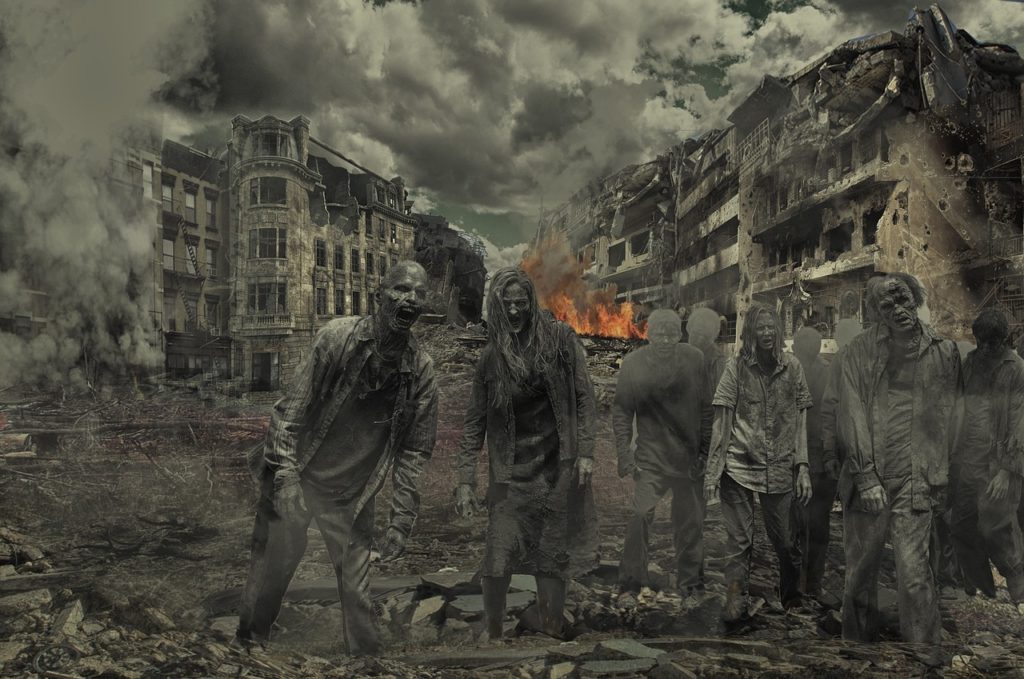
Ahmadreza89 / Pixabay
We’ve seen nine seasons of AMC’s The Walking Dead. The remaining children are still alive.
At the end of the mid-season finale of the 8th season AMC’s The Walking Dead, Carl Grimes reveals that he’s been bitten. Fans were upset. 50,000 fans signed a petition to remove showrunner Scott Gimple from the show. He was removed.
Why were they so upset?
I think it’s because children, Rick’s children, Carl and Judith, and Maggie’s child, unborn at the time, mean something. They are a glimmer of future hope in a very dark world. Perhaps they represent our hope as well, because, for some of us, the real world is very dark as well.
In season 9, Henry is spared and Carol burns a group of former Saviours alive to protect him. It’s a trade we all accept. Why?
Besides innocence, children represent hope. And to kill a child is to kill hope. To save a child is to preserve hope.
[click_to_tweet tweet=”AMC’s The Walking Dead brings Christmas Hope. #TheWalkingDead #TWD #Zombies #ZombieChristmas” quote=”AMC’s The Walking Dead brings Christmas Hope. “]
The thing is, we shouldn’t be all that upset with Gimple for killing off Carl Grimes. Gimple, or any loss of a child in suture seasons because this is what zombie storytellers always do–they give us characters that embody things that we value and then the kill them.
Night of the Living Dead
This goes all the way back to Night of the Living Dead in which most of the traditional values are murdered.
- Barbara embodies devotion–dead.
- Johnny, cynicism of every kind–dead.
- Ben, the hero–dead.
- Tom and Judy, romantic love–dead and dead.
- The Coopers, the nuclear family–dead, dead and dead. This, of course, includes little Karen, representative of innocence, who slays her mother with a cement trowel.
Zombies Are Trying to Tell Us Something
[click_to_tweet tweet=”If you are watching a show about zombies, get ready for the things you hold dear, and the characters who represent them, to snuff it. #TWD #TheWalkingDead #Zombies” quote=”If you are watching a show about zombies, get ready for the things you hold dear, and the characters who represent them, to snuff it.”]
Zombie narratives force us to face the contradictions between what we profess and what we actually believe. It’s why monsters appear, and why the zombies have been so popular for the last fifty years.
On the one hand, we profess that there is no God, no universal truth, no ultimate meaning in life. In our culture, individuals get to make these things up for themselves.
On the other hand, we believe that families and promises and honesty and courage and fair play matter. We live and act as if things like these are universal and objective. We believe it’s wrong to deny someone their rights. We believe that it’s wrong to exploit the weak. That it’s wrong to use women for sex against their will. We believe it’s wrong to kill and eat other people. We believe these things to be universally wrong. We profess that life has no universal meaning, but we love the parts in TWD where the characters talk of the “something else” that we are fighting for that goes beyond survival.
Zombie narratives don’t let us get away with these inconsistencies.
Much of what Carl did in the final episode of Season 8 was to make his life have some meaning before he died–I can’t recall exactly, but I think his last words included, “I did this” as he pointed to all the people he safely evacuated from exploding Alexandria.
Does Carl’s life have meaning? Does his death? Yes or No? We can’t have it both ways.
His future is now certain–he will either be dead or he will be lurching-dead–that’s it. In the fictive world of The Walking Dead, millions have already met one of these two ends.
But the central question to zombie narratives is, if there is no transcendent meaning, is our existence any more meaningful than a zombie? Death is certainly at the end. Perhaps we can say, “I did this.” Is this adequate? Is this all there is?
Don’t get mad at Gimple. This is all our idea.
Unless, of course, there is a transcendent God in whom Truth and Meaning dwell–who Loves the world so much that he has come to us as a baby, to live among us to show us the way out of zombieland.
Merry Christmas
The Meaning of Zombies
If you are interested, here is the first post of a series about the meaning of zombies: Zombies: A Whole New Kind of Monster

Great article; we are lost without hope! We have to traverse a world of danger, but amidst the tool and turmoil there is one greater who has provided a way out. We can’t do this, be He did this…
The cure for zombies…